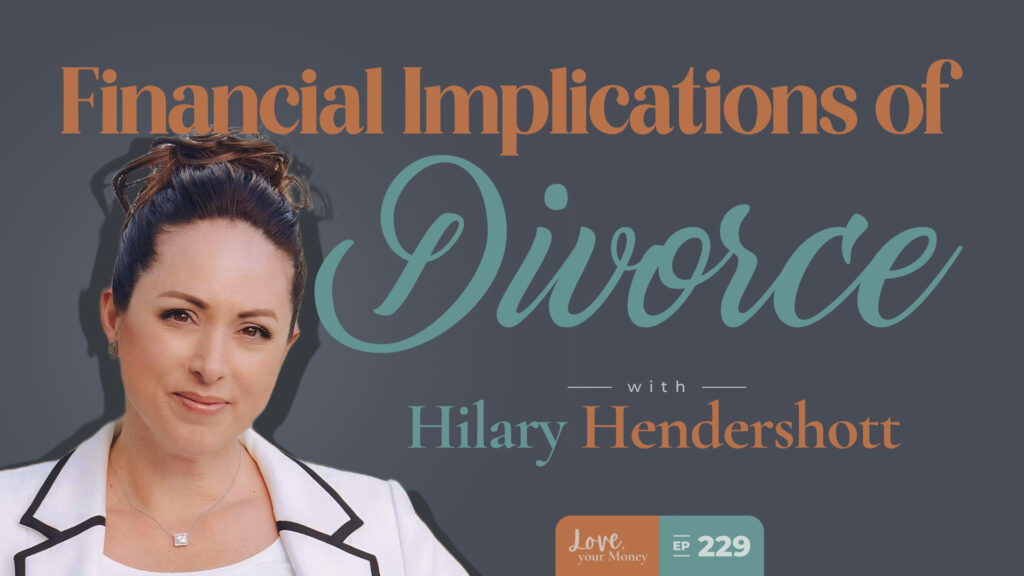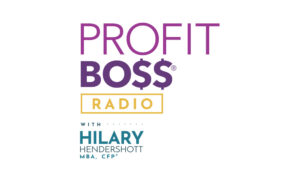Welcome to episode 229 of Love, your Money! In this episode, I’ll be talking about a topic that impacts many people, the financial implications of divorce. This episode will serve as a primer for next week’s interview with an expert in this field, so be sure to check out part 2 next week.
I’ve seen how divorce affects people’s lives firsthand after watching my parents each divorce and get remarried more than once before I was old enough to vote. I’ve also seen the impact of a divorce in my professional career with many clients over the years. When a marriage ends, it can be devastating for many reasons. Emotions are running high, which can create tension and resentment when you’re trying to settle debts and divvy up your assets.
So today, I’ll be sharing some do’s and don’ts on how to proceed when faced with a life-changing event during a divorce. You’ll hear actionable advice on the value that a professional like a CDFA (Certified Divorce Financial Analyst) can add to your situation and tips on starting the next phase of your life with a “clean slate.”
Here’s what you’ll find out in this week’s episode of Love, your Money:
- Avoid taking on new debts and being vindictive
- If the debt is in your name, then you’re responsible!
- The emotional toll of going through a divorce
- When to hire a professional like a CDFA
- The value of having a professional help divide assets
- How proper financial planning helps start over with a clean slate
Inspiring Quotes
“If you’re navigating the initial stages of a divorce, it really is important to handle your finances with care.”
– Hilary Hendershott
“Cultivating a positive money mindset involves recognizing that you have control over your financial decisions and your future.”
– Hilary Hendershott
“If you take consistent positive actions, you’ll find that you naturally move from a mindset of scarcity or fear of what’s coming, to one of potentially abundance, but definitely pride and confidence.”
– Hilary Hendershott
Resources and Related to Love, your Money Content
Enjoy the Show?
- Be sure to subscribe to Money Love Notes so that you get our latest announcements, offers, articles, and resources straight to your inbox!
- Don’t miss an episode, subscribe via Apple Podcasts, Spotify, Google Podcasts, Overcast, or wherever you listen!
- Leave us a review on Apple Podcasts and share the show with your friends.
- Don’t miss out on the 7 Steps to Wealth Audio Guide! It’s free and comes with weekly emails that walk you through each step.
Transcript
Hilary Hendershott: Well, hello and welcome back to Love, your Money. I’m here to empower you to take control of your financial future. I’m your host, as always, Hilary Hendershott. I’m here to guide you through the world of wealth and well-being. Today, we’re exploring a topic that affects many lives, reshaping your financial world through and after a divorce. Divorce affected my life even though I myself have never been divorced but my parents got divorced three times from different people before I turned 16. Actually, divorced and remarried, like I guess you could say it was one divorce and four marriages. So, they got divorced when I was five or six and then they both got remarried. My parents got divorced. They both got remarried before I turned 10. And then they both got divorced from those people and remarried again. So, the final remarriage occurred around my 17th birthday.
So, I’ve lived through lots of divorce. I’m sure you already know that half of marriages in the United States end in divorce. Maybe you didn’t know that divorce for older Americans has been increasing at a fast pace. So, since 1990, the divorce rate for those over 55 has doubled and for those over 65, it has tripled. Those are really staggering statistics. I’m not going to try to analyze them. And behind each of those numbers is an individual story. Each story involves not just potentially emotional upheaval, but significant financial reorganization. Of course, divorce isn’t just about ending a relationship. It’s about dismantling a financial partnership too but divorce can be an opportunity for a fresh financial start. So, today, we’ll cover how to embrace this change as a positive force, strategies for rebuilding and managing your finances, and ways to plan for a prosperous and fulfilling future. So, if you’re ready to start and turn the page on a brand new financial future, financial story, this episode is for you.
You’ve heard me say many times on Love, your Money that marriage is a financial partnership, which means that a separation or divorce is the process of unraveling that financial partnership. So, today, I’m going to share with you some of the advice my team and I give to our clients who think they may be facing a separation with their spouse. If you’re navigating the initial stages of a divorce, it really is important to handle your finances with care. First, if you’re considering divorce or know you’re headed that direction, definitely avoid taking on significant new debt. Equally important is to resist the temptation to drain shared bank accounts or retirement accounts. I know the pull can be strong, but financially vindictive actions not only create distrust, and sometimes anger or resentment, but they can really have legal repercussions and negatively impact the outcome of your settlement.
Legal ownership matters. You will be required to pay debt that’s taken out in your name. Credit card companies will come after the person whose name the card is in. The same goes for car loans. And of course, if your spouse takes out debt in your name, and you don’t pay it, it’s your credit score that suffers, not always theirs. If the Visa card is in your name, and your ex-spouse buys a new set of golf clubs on that card, you will be legally responsible for making that payment. If it’s joint, then you’re both responsible. Legal ownership will also likely dictate who is legally responsible for payment after you divorce. The more you can be aware of these financial rules and expectations and handle them prudently, the smoother your path really will be in getting through the divorce process and setting the stage for a more secure, and thriving financial future. I mean, really, you can get through this.
Let me tell you a story about a client of mine. Let’s call her Erica. She and her husband had been separated for about six months working through the financial implications of divorce. So, she and her ex are dividing assets including everything from the family home and savings accounts to investments of company stock and shared debts. For Erica and many like her, the emotional toll really was significant. She was really grieving at the end of not only her marriage but this significant change in her financial life. I mean, you kind of have to split everything. Her spouse was the primary earner and now she’s reassessing what she could actually even afford. “Can I even maintain my lifestyle, Hilary?” Of course, emotions can and often do heavily influence financial decisions. And in Erica’s case, she was feeling really uncertain and stressed.
She was concerned that her very strong emotions might influence her judgment during such a critical time. So, I wouldn’t say Erica’s stress went away quickly but the more empowered she felt during the divorce process, the less uncertainty and anxiety I heard from her during our conversations. So, she was making decisions powerfully and was clear about the direction she was heading over time. That’s for sure. Honestly, my experiences during those highly stressful, highly anxious periods of time, just try not to make any permanent decisions. Get to a place where you have a somewhat level head before you’re putting things in the ground that are permanent, putting stakes in the ground that are permanent.
One of the most challenging things for Erica was the mediation process and her limited understanding of the financial terms and questions being asked of her. So, when you go through divorce proceedings, each state is different. And I have listeners in all 50 states all around the US, but most states will ask you to voluntarily go through a process of mediation. This minimizes legal fees and helps you work together with your spouse to split financial assets. The alternative in most states is to have lawyers represent you. And ultimately, if you just cannot agree, a judge might have to determine the split of your assets. Erica and her soon-to-be ex went through the process of mediation, and in that process found that she didn’t fully understand the implications of selling the marital home and splitting the investment accounts. So, remember, in mediation, you’re coming to a mutual agreement.
Erica was being asked to make decisions and she really didn’t understand the ins and outs of those choices. Now, if you find yourself in a similar situation, you could consider hiring a CDFA or a certified divorce financial analyst. In fact, I will be interviewing one in next week’s episode. CDFAs specialize in the nuts and bolts of the financial side of divorce. Some of the things you might have to navigate in a divorce that are extremely complex include, for example, dividing an annuity or what to do with life insurance, how to value privately held businesses, and calculating equitable alimony and child support. These are all things that a good financial advisor or a CDFA can help with. The CDFA’s role is particularly important in divorces involving complex financial portfolios or significant, especially business, assets.
So, as I mentioned in next week’s episode, I’ll be interviewing Karen Sparks. She is a JD and a CDFA. We’re going to dig deeper into how someone like her can help people going through a separation and when it’s advantageous to hire a CDFA. Couples who are divorcing need to achieve an equitable division of assets. Since you can’t split a family home in half and I’m sure you know this, you have to either sell your home or one or the other spouse has to buy the other one out. Accounts that can be split in half like savings, brokerage, or retirement accounts usually are just split in half. Yes, you can split a retirement account in half. You need a court order called a QDRO. It’s an acronym, Q-D-R-O. So, if your spouse has a larger IRA or 401(k) than you, the money can be moved over.
Agreeing on alimony and child support is another crucial step. These payments really need to be determined in a way that reflects the financial circumstances of both parties, considering things like income disparity, the length of the marriage, and the needs of the children involved. And all of these decisions might have tax consequences. This is where my team was able to offer a ton of support to Erica, so we came alongside her to ensure she didn’t lose the primary residence tax exclusion when the marital home was sold, and that the taxes owed on the sale of company stock would be the same to her as it was to her ex. Yes, the account balances can be split equally but in some cases if the assisting of the counsel, if your financial team advising you doesn’t understand the tax consequences, one spouse can end up with really unfair tax advantages over the other one.
So, Erica needed an experienced advisor to help ensure that the tax liability was also split evenly. These were things she had never even thought of before. So, as my conversations with Erica started to shift to planning for life post-divorce, I noticed a change in her willingness to participate. The stress and anxiety that she initially came in with was gone. She smiled more. She bought furniture that she herself selected alone for the first time. She picked the house that she walked into and felt like, “I belong here. I know my ex would never have bought this house and I can now pay cash for it.” We helped her create a new spending plan. This wasn’t just about crunching numbers. It really is about her authoring her life and her priorities as a single person. So, her ongoing income sources are her new job and spousal support from her ex.
Then we got to work on her cash flow automation. This is a system that’s an alternative to budgeting. It works really well to rein in spending and reverse engineer savings. If you’d like to know more about automation, go check out Episode 84 of this podcast, which is called Automate Your Financial Freedom. This exercise wasn’t just about making sure she could pay her bills. It’s also about empowering her to have a sense of control over her financial future. Okay. So, next, we focused on Erica’s credit because she did come out of the marriage with a little bit of credit card debt. So, together, we made sure there was a plan to have her debt-free with a high credit score. Savings was another area where Erica really needed to feel empowered. Once the cash flow automation plan was completed, we really had a ton of clarity about what her overhead and spending was. So, by process of elimination, we know exactly what she can save every month because if it’s coming in and you’re not spending it, we know you can save it.
Erica had been relying on her ex to save for retirement but now she has to take care of herself. So, we had her start saving in our company 401(k) plan and that’s something else she didn’t think she could do. Throughout the process, Erica really discovered an inner strength and even a financial acumen that she didn’t know she had. Learning to manage her finances not only provided her with practical skills but also played a significant role in her emotional recovery. It was empowering for her to see herself not just as a divorcee, but as an independent, financially savvy woman. And that’s where she’s at now. She’s really grateful for her newfound independence and she’s enjoying making choices for herself for the first time in decades. She really does have optimism and she says she feels like she’s entered a phase of life that she’s excited about.
Separation and divorce can be a really traumatic disruption. And I don’t mean to overlook, and I’m certainly not overlooking the potentially devastating emotional impacts, right? Like I said, I’ve lived through that. And so, I know what that is. Obviously, divorce can have a significant impact on the financial stability of both parties. So, my role can be to impact and bolster that financial stability. And it’s not easy to build up the strength it takes to keep moving forward. I mean, I really respect and have honestly deep awe of people like Erica who see the opportunity to redefine their personal narrative and emerge from this process stronger and more empowered. That strength really can give you the opportunity to move forward and define your future goals. Post-divorce goals probably look different from what they were before. You have time to reassess your priorities and align your money trajectory with what’s important to you.
Retirement Planning, though, does demand special attention. You might need to adjust your savings and investment strategies to reflect your current financial situation. Don’t worry though, it’s like many things in life. It matters most what you do most of the time. So, as long as you check in with your financial advisor, get your plan restructured, you can have confidence that you’re still on track for success. If you have children, planning for their education might be a top priority. This might involve setting up or revising education savings plans. Sometimes ownership of these is dictated by the divorce agreement, which is called a marital settlement agreement or MSA. After your divorce, you really have a clean slate type of opportunity to redefine your relationship with money.
Erica has shown me and my team that it can be a time to shift from viewing money as a source of stress to seeing it as a tool for empowerment. Cultivating a positive money mindset involves recognizing that you have control over your financial decisions and your future. If you take consistent positive actions, I think you’ll find that you naturally move from a mindset of scarcity or fear of what’s coming to one of potentially abundance but definitely pride and confidence. For those looking to rebuild and strengthen your financial independence post-divorce, consider seeking out resources like financial workshops or supportive communities and of course professional financial advice. And definitely tune in next week for my interview with Karen Sparks. Success stories abound for individuals who have turned the challenge of a post-divorce financial reset into an opportunity for growth and empowerment.
I hope Erica’s story inspires you as much as she inspired me and the gals who work for me. So, really, whether it’s successfully managing your savings, rebuilding your credit, or investing wisely for your future, each step you take is a testament to your resilience and a commitment to your financial well-being. Thanks for being here for this episode of Love, your Money.
Disclosure
Hendershott Wealth Management, LLC and Love, your Money do not make specific investment recommendations on Love, your Money or in any public media. Any specific mentions of funds or investments are strictly for illustrative purposes only and should not be taken as investment advice or acted upon by individual investors. The opinions expressed in this episode are those of Hilary Hendershott, CFP®, MBA.





